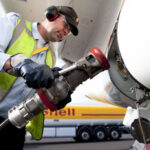The International Air Transport Association (IATA) has established a global registry for sustainable aviation fuel to provide airlines with access to supplies and enable them to claim their SAF purchases as contributions to climate-related obligations. The registry, to be managed independently by IATA’s newly formed Civil Aviation Decarbonisation Organisation (CADO), is designed to connect carriers with SAF producers and suppliers globally, and to record SAF transactions “in an immutable way” through a standardised and transparent process. CADO will track and record the environmental attributes of the fuel purchases to protect against double-counting, enabling airlines, fuel producers, regulators and other stakeholders to accurately record details of their SAF deals. It will also provide corporate customers of passenger and freight airlines with access to in-sector emissions reductions which they can offset against their own flight impacts, while tapping their ability to share the cost of decarbonising air transport.
The new SAF Registry was created in consultation with airlines, aerospace manufacturers, fuel producers and suppliers, and corporate travel management groups. It is supported by IATA’s SAF accounting and
reporting methodology to ensure consistent recording of environmental benefits attached to purchases of alternative fuels, no matter where they are bought or ultimately used. Already, more than 30 organisations have signed up.
To help maximise development of SAF, the new registry is feedstock and technology neutral, supporting diverse production pathways for alternative fuels. While endorsing global harmonisation of rules, the registry will be able to accommodate different regulations governing SAF production. As well, to support competition and open markets, it will be inter-operable with other SAF registries.
While IATA’s new registry is managed independently by CADO, a not-for-profit organisation based in Montreal and established last month under Canadian laws, it will still receive ongoing technical and operational support from IATA.
Membership is open to any international organisation in the SAF value chain, with initial participants including passenger and freight airlines, aerospace manufacturing companies, SAF producers and facilitators.
Among them are four major airline groups (IAG, Lufthansa, LATAM and Malaysia’s MAG), the world’s two largest airlines by capacity deployed (American and Delta), freight giants Atlas Air and DHL, and Gulf carriers Emirates, Etihad and Qatar Airways. Other participants include airframers Airbus and Boeing, engine maker GE Aerospace, and SAF producers or providers including LanzaJet, SkyNRG, EcoCeres, Infinium and OMV.
“Ramping up SAF production is the common goal and the structure we are putting in place with CADO is an important step in moving decarbonisation forward,” said IATA’s Director General, Willie Walsh.
“The SAF Registry is a critical piece of market infrastructure that is indispensable in building a global, transparent and liquid global market for SAF.
“The industry’s commitment to build the Registry and establish CADO to manage it should inspire governments, fossil fuel producers and investors to engage in the SAF market with commensurate vigour.”
Marie Owens Thomsen, IATA’s SVP Sustainability and Chief Economist, said CADO’s mandate was to operate the SAF Registry independently of IATA “with an open and global approach that supports the scrutiny needed to build trust among all stakeholders.”
But while IATA’s registry was “of fundamental importance and a historically momentous advance,” Owens Thomsen cautioned it was “but one step along the way to a mature, transparent and liquid global SAF market.”
Greater policy support was still needed from governments, she said, including a commitment to redirect funding away from fossil fuel producers, instead favouring renewable energy.
“The precedent of the wind and solar energy markets is the example to follow, and this without any further delay,” she added.
“Aviation’s decarbonisation is a team effort. In releasing the SAF Registry to CADO for launch, we have put in place a critical platform for the benefit of all stakeholders. The door is open for any stakeholder in the SAF value chain, including governments, to join CADO. This inclusive approach should also be a force for the harmonisation of the principles on which all SAF registries operate.”
Among the participants in the IATA SAF Registry is Dublin-based Future Energy Global, which enters into long-term offtake agreements with SAF producers and then facilitates book-and-claim deals in which corporations wanting to offset their air travel emissions can purchase SAF equivalent to the fuel used in business or freight flights. That fuel is then used by airlines, while its environmental attributes are retained by the purchasing corporations.
“Future Energy Global is proud to be one of the first cohort of members of the SAF Registry,” said the company’s CEO and Founder, Natasha Mann. “We’re already seeing strong interest in our book-and-claim solutions from airlines, fuel suppliers and corporates, and we look forward to leveraging the strengths of the SAF Registry to help grow the global SAF market and reduce aviation emissions.”
Photo: Airbus is one of the early participants in the SAF Registry














More News & Features
SAF One announces new investment and technology partners for Middle East SAF project
New initiative formed to accelerate SAF adoption and production in the Pacific Northwest
EcoCeres opens new Malaysia production facility as SAF ambition in Asia scales up
Aviation, shipping and fuel leaders convene in Rotterdam to accelerate sustainable fuels scale-up
EU SAF mandates will have to be revised, predicts French oil chief
Lessons learned from the collapse of Fulcrum BioEnergy